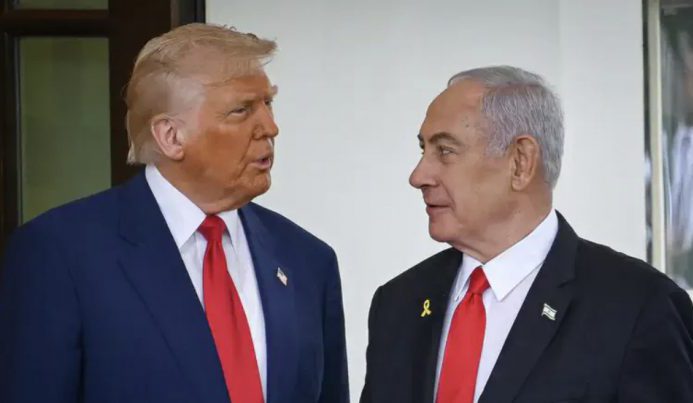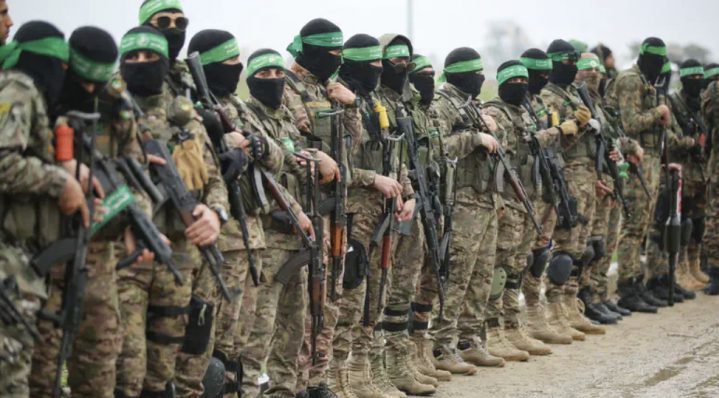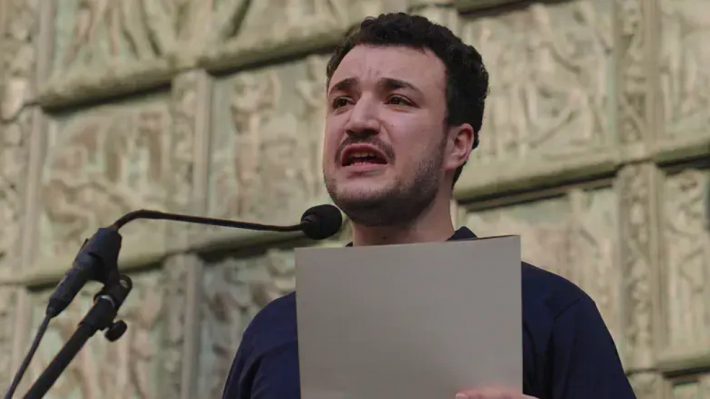As US President Donald Trump pushes for a deal, Israeli Prime Minister Benjamin Netanyahu warns time is running out and readies military options, NYT report says. ‘Only a deal that dismantles all infrastructure is acceptable.’
As the Trump administration moves toward a possible nuclear deal with Iran, Israeli Prime Minister Benjamin Netanyahu is reportedly considering a preemptive strike on Iran’s nuclear facilities, according to officials cited by The New York Times.
The divergence in approach — diplomacy versus military action — has led to tense conversations, including a heated phone call between US President Donald Trump and Netanyahu, as well as a series of high-level meetings in Washington and Europe.
Trump stated Sunday that “something good” could emerge from his diplomatic push “in the next two days,” NYT said. Still, sources involved say only a framework of shared principles may materialize, with negotiations ongoing over uranium enrichment, fuel stockpiles, and whether materials will be exported or diluted.
While Israel is not part of the talks, Netanyahu argues Iran’s current vulnerability is an opportunity for a decisive strike, while Trump sees it as leverage for diplomacy. Israeli officials worry Trump, eager to secure a deal stronger than former US President Barack Obama’s 2015 agreement, may let Iran retain enrichment capacity.
Netanyahu recently said a “good deal” must dismantle “all of the infrastructure” of Iran’s nuclear program — including deep-underground sites like Fordow and Natanz. The NYT report is based on anonymous officials from Israel, the US, and Europe.
Israeli Minister Ron Dermer and Mossad chief David Barnea met with Trump’s envoy Steve Witkoff in Rome, then traveled to Washington to speak with CIA Director John Ratcliffe. Dermer and Witkoff also held follow-up talks.
Asked by NYT for comment, White House officials pointed to Trump’s earlier remarks that he would “love to see no bombs dropped.”
Talks between Witkoff and Iranian negotiator Abbas Araghchi have stalled over the US demand for zero enrichment on Iranian soil — a condition Iran rejects. Araghchi posted on social media: “If the Western powers insist on ‘zero enrichment’ in Iran… there is nothing left for us to discuss.”
Experts say any interim agreement must ensure Iran removes or significantly dilutes its near-weapons-grade uranium to satisfy critics.As the Trump administration moves toward a possible nuclear deal with Iran, Israeli Prime Minister Benjamin Netanyahu is reportedly considering a preemptive strike on Iran’s nuclear facilities, according to officials cited by The New York Times.
The divergence in approach — diplomacy versus military action — has led to tense conversations, including a heated phone call between US President Donald Trump and Netanyahu, as well as a series of high-level meetings in Washington and Europe.
Trump stated Sunday that “something good” could emerge from his diplomatic push “in the next two days,” NYT said. Still, sources involved say only a framework of shared principles may materialize, with negotiations ongoing over uranium enrichment, fuel stockpiles, and whether materials will be exported or diluted.
While Israel is not part of the talks, Netanyahu argues Iran’s current vulnerability is an opportunity for a decisive strike, while Trump sees it as leverage for diplomacy. Israeli officials worry Trump, eager to secure a deal stronger than former US President Barack Obama’s 2015 agreement, may let Iran retain enrichment capacity.
Netanyahu recently said a “good deal” must dismantle “all of the infrastructure” of Iran’s nuclear program — including deep-underground sites like Fordow and Natanz. The NYT report is based on anonymous officials from Israel, the US, and Europe.
Israeli Minister Ron Dermer and Mossad chief David Barnea met with Trump’s envoy Steve Witkoff in Rome, then traveled to Washington to speak with CIA Director John Ratcliffe. Dermer and Witkoff also held follow-up talks.
Asked by NYT for comment, White House officials pointed to Trump’s earlier remarks that he would “love to see no bombs dropped.”
Talks between Witkoff and Iranian negotiator Abbas Araghchi have stalled over the US demand for zero enrichment on Iranian soil — a condition Iran rejects. Araghchi posted on social media: “If the Western powers insist on ‘zero enrichment’ in Iran… there is nothing left for us to discuss.”
Experts say any interim agreement must ensure Iran removes or significantly dilutes its near-weapons-grade uranium to satisfy critics.
Netanyahu, long a skeptic of diplomacy with Tehran, is once again threatening military action — even without US support. American intelligence reportedly detected Israeli preparations for such a strike and briefed Trump. During a phone call, Netanyahu did not deny the reports and stressed the urgency of acting before Iran regains strength.
US military officials doubt Israel could achieve significant results without US aid. Still, some Israeli officials believe the US would be forced to intervene if Iran retaliated.
Even if an agreement is reached, Israeli officials say Netanyahu might strike anyway. After meeting Trump in April, he directed national security staff to continue preparing for potential operations — including independent, limited strikes if necessary.
Plans reportedly range from targeted hits to extended bombing campaigns, even in densely populated areas.Netanyahu, long a skeptic of diplomacy with Tehran, is once again threatening military action — even without US support. American intelligence reportedly detected Israeli preparations for such a strike and briefed Trump. During a phone call, Netanyahu did not deny the reports and stressed the urgency of acting before Iran regains strength.
US military officials doubt Israel could achieve significant results without US aid. Still, some Israeli officials believe the US would be forced to intervene if Iran retaliated.
Even if an agreement is reached, Israeli officials say Netanyahu might strike anyway. After meeting Trump in April, he directed national security staff to continue preparing for potential operations — including independent, limited strikes if necessary.
Plans reportedly range from targeted hits to extended bombing campaigns, even in densely populated areas.





